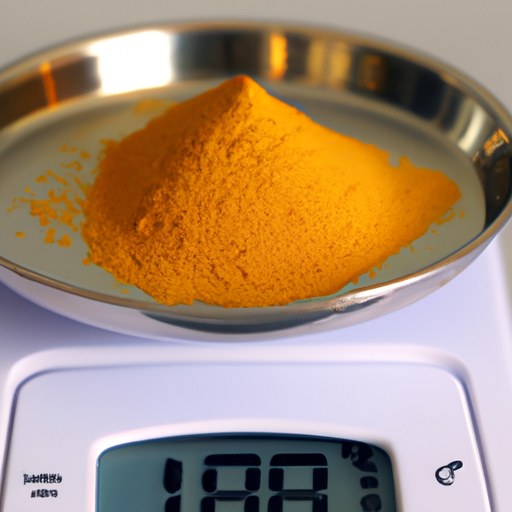Are you seeking a natural method to enhance your health? You can’t go wrong with turmeric tea.
This golden-hued drink has been a staple in traditional medicine for centuries, and modern research is starting to uncover the many benefits it provides.
Turmeric is a spice that comes from the turmeric plant, and it’s commonly used in Indian and Southeast Asian cuisine. The active ingredient in turmeric is called curcumin, which is responsible for many of its health benefits.
When you drink turmeric tea, you’re getting a concentrated dose of curcumin, which can help with everything from reducing inflammation to improving brain function.
In this article, we’ll explore the many ways that turmeric tea can benefit your body.
Key Takeaways
- Turmeric tea contains curcumin, which is responsible for many health benefits such as reducing inflammation, improving brain function, and boosting immunity.
- It can alleviate symptoms of chronic diseases, improve digestion, soothe the stomach lining, and reduce joint pain and stiffness.
- Turmeric tea is also beneficial for heart health, diabetes management, and skin health.
- However, it should not be used as a substitute for professional medical treatment, may cause side effects in high doses, and should be consumed as part of a healthy lifestyle that includes regular exercise and a balanced diet.
History of Turmeric in Traditional Medicine
Did you know that for centuries, people in India and China have been using turmeric in traditional medicine to treat a variety of ailments? Turmeric’s traditional use dates back to ancient times, where it was used as a natural remedy for digestive issues, inflammation, and skin problems. It has been an integral part of Ayurvedic medicine, an ancient Indian system of medicine that focuses on natural healing and balancing the body’s energies.
Turmeric’s cultural significance is also evident in its use in traditional ceremonies and rituals. In Hinduism, turmeric is considered a sacred spice and is used in wedding ceremonies and other important rituals. Its vibrant yellow color is often associated with prosperity, happiness, and purity.
With such a rich history, it’s no wonder that turmeric has gained popularity in the Western world as a natural remedy for various health issues. So, what is turmeric tea?
What is Turmeric Tea?
Turmeric tea is a warm and golden beverage that has been praised for its natural healing properties. It is made by brewing turmeric powder or fresh turmeric root in hot water and can be mixed with ginger, honey, lemon, or cinnamon for added flavor and benefits. Here are some of the health benefits and methods of preparation of turmeric tea:
- Anti-inflammatory: Turmeric contains a powerful compound called curcumin, which has anti-inflammatory properties that can alleviate symptoms of chronic diseases such as arthritis, asthma, and heart disease.
- Boosts immunity: Turmeric tea can strengthen your immune system due to its antioxidant and anti-inflammatory properties, helping to fight off infections and reduce the risk of chronic diseases.
- Aids digestion: Drinking turmeric tea after meals can improve your digestion and alleviate digestive issues such as bloating, gas, and constipation.
- Promotes relaxation: Turmeric tea can promote relaxation and reduce stress due to its anti-inflammatory and antioxidant properties, helping to improve mood and cognitive function.
Incorporating turmeric tea into your daily routine can have numerous health benefits. In the next section, we will explore the anti-inflammatory properties of turmeric and how they can benefit your body.
Anti-Inflammatory Properties
If you suffer from joint pain or arthritis, turmeric tea may be just what you need. Turmeric contains curcumin, a powerful anti-inflammatory compound that can help reduce inflammation in the body. This can lead to a reduction in joint pain and stiffness, making it easier to move around and enjoy your daily activities.
Additionally, turmeric tea has been shown to help with digestive issues like bloating, gas, and stomach cramps. So if you’re looking for a natural way to improve your overall health, consider giving turmeric tea a try.
Reducing Joint Pain and Arthritis
Relieving achy joints and stiff movements is one of the benefits of consuming turmeric tea on a regular basis. The anti-inflammatory properties in turmeric are responsible for reducing inflammation and improving mobility, which can be especially helpful for those suffering from joint pain and arthritis.
In fact, a study published in the Journal of Medicinal Food found that turmeric supplements were more effective than a placebo in reducing joint pain and improving joint function in patients with knee osteoarthritis. Turmeric tea can also improve overall joint health by reducing oxidative stress and preventing the breakdown of cartilage.
This is important because as we age, our joint cartilage naturally deteriorates, leading to joint pain and stiffness. By adding turmeric tea to your daily routine, you can help protect your joints and potentially even slow down the progression of arthritis.
Next, we’ll discuss how turmeric tea can also help with digestive issues.
Helping with Digestive Issues
Improving digestion is another benefit of regularly consuming turmeric tea, which can work wonders for your gut health. Natural remedies, such as turmeric, have been used for centuries to treat a variety of digestive issues.
Here are four ways turmeric tea can help with digestive problems:
-
Reducing inflammation: Turmeric contains compounds that have anti-inflammatory properties, which can help reduce inflammation in the gut and ease digestive discomfort.
-
Promoting healthy gut bacteria: Turmeric has prebiotic properties, which means it can help promote the growth of healthy gut bacteria. This can improve overall gut health and aid in digestion.
-
Soothing the stomach: Turmeric can help soothe the stomach lining and reduce irritation, which can help alleviate symptoms of indigestion and heartburn.
-
Relieving gas and bloating: The carminative properties of turmeric can help relieve gas and bloating by promoting the release of digestive enzymes and reducing inflammation in the gut.
Incorporating herbal remedies, like turmeric tea, into your daily routine can have a positive impact on your digestive health. As we move on to discussing the antioxidant properties of turmeric, it’s important to note that these benefits work together to improve overall wellness.
Antioxidant Properties
By regularly drinking turmeric tea, you’ll experience the benefits of its antioxidant properties, which can help protect your body against cellular damage caused by free radicals. Free radicals are unstable molecules that are produced naturally in the body, but can also come from external sources such as pollution, radiation, and cigarette smoke. When there are too many free radicals in the body, they can cause oxidative stress, which can contribute to a variety of health issues including cancer, heart disease, and Alzheimer’s disease.
Incorporating antioxidants into your diet can help counteract the effects of free radicals and reduce the risk of these health issues. Turmeric, along with other food sources with high antioxidants such as berries, nuts, and leafy greens, can play a role in protecting your body. The table below shows some of the top food sources of antioxidants and their associated benefits. So by drinking turmeric tea, you can not only enjoy its delicious taste, but also reap the benefits of its antioxidant properties in protecting your body against cellular damage.
Transitioning into the next section about brain function, research has also shown that turmeric may have positive effects on cognitive function and brain health.
Brain Function
If you’re looking to improve your memory and focus, turmeric tea may be just what you need. This powerful spice has been shown to enhance cognitive function and boost brain health.
Additionally, turmeric tea may have potential as a treatment for depression. It has been found to have mood-boosting properties.
Improving Memory and Focus
You’ll find yourself more mentally sharp and focused after sipping on turmeric tea, like a key turning in a lock. One study has shown that curcumin, the active ingredient in turmeric, can improve memory and attention in older adults with mild cognitive impairment.
In addition to drinking turmeric tea, incorporating memory techniques and brain exercises into your daily routine can also help keep your mind sharp. Some examples of memory techniques include repeating information out loud, creating associations with new information and existing knowledge, and using visualization techniques.
Improving memory and focus goes beyond just being able to recall information more easily. It can also lead to increased productivity and a better quality of life. So, if you’re looking for a natural way to give your brain a boost, try incorporating turmeric tea into your routine along with other healthy habits.
And speaking of healthy habits, let’s move on to the next section where we’ll explore the potential treatment for depression.
Potential Treatment for Depression
To alleviate symptoms of depression, it’s important to explore potential treatments that work for you. Using turmeric tea as a potential treatment for depression, the benefits and possible risks should be considered.
Turmeric contains an active ingredient called curcumin, which has been found to have anti-inflammatory and antioxidant properties that may help alleviate symptoms of depression. Studies have shown that curcumin can boost levels of brain-derived neurotrophic factor (BDNF), a protein that promotes the growth and survival of neurons. Low levels of BDNF have been linked to depression and other mental health disorders.
However, while turmeric tea may have potential benefits for treating depression, it’s important to note that it should not be used as a substitute for professional medical treatment. It’s important to speak with your doctor or mental health professional before trying any new treatments for depression. Additionally, turmeric can interact with certain medications and may cause side effects such as nausea or diarrhea.
As with any treatment, it’s important to weigh the potential benefits against the possible risks before deciding whether to use turmeric tea for depression. With that being said, let’s explore how turmeric tea can benefit your heart health.
Heart Health
By regularly drinking turmeric tea, your heart can benefit from its anti-inflammatory properties which may help reduce the risk of heart disease. Inflammation is a natural response of the body to injury or infection, but chronic inflammation can lead to various diseases, including cardiovascular disease. Turmeric contains a compound called curcumin, which has been found to have potent anti-inflammatory effects.
By reducing inflammation in the body, turmeric tea may help improve the health of your heart. Of course, turmeric tea is not a magic cure-all for heart disease. It should be consumed as part of a healthy lifestyle that includes regular exercise and a balanced diet.
Exercise has been shown to improve heart health by reducing blood pressure, strengthening the heart muscle, and improving circulation. A balanced diet, rich in fruits, vegetables, whole grains, lean protein, and healthy fats, can also help reduce the risk of heart disease. With these lifestyle changes, along with the regular consumption of turmeric tea, you may be able to improve your heart health and reduce your risk of heart disease.
Moving on to the next topic, let’s look at how turmeric tea may also help with diabetes management.
Diabetes Management
If you’re concerned about diabetes prevention or blood sugar control, turmeric tea may be worth considering. Studies have shown that curcumin, the active ingredient in turmeric, can improve insulin sensitivity and lower blood sugar levels. This is great news for those at risk for diabetes or struggling to maintain healthy blood sugar levels.
Here are four ways turmeric tea can benefit your diabetes management:
- Curcumin can improve insulin sensitivity, allowing your body to better utilize glucose for energy.
- Turmeric tea may help lower blood sugar levels, reducing your risk of developing diabetes.
- Regular consumption of turmeric tea can reduce inflammation, which has been linked to insulin resistance and diabetes.
- Curcumin may protect against pancreatic damage, a risk factor for diabetes.
Overall, adding turmeric tea to your diet could be a simple and effective way to support your diabetes management goals. And if you’re interested in even more benefits, keep reading to learn how turmeric tea can improve your skin health.
Skin Health
Achieve a glowing complexion that radiates from within by incorporating turmeric into your daily routine. Turmeric tea boasts natural remedies that can help improve skin health. The active ingredient in turmeric, curcumin, has been shown to have anti-inflammatory and antioxidant properties. This means that it can help reduce inflammation in the skin and protect against damage caused by free radicals.
In addition to drinking turmeric tea, you can also apply it topically to your skin. Mixing turmeric with honey or yogurt can create a face mask that can help brighten and even out your skin tone. However, it’s important to patch test first to make sure that you aren’t allergic to turmeric.
By incorporating turmeric into your daily routine, you can see improvements in your skin’s texture and overall appearance. Now, let’s discuss the potential risks and side effects of using turmeric for skin health.
Potential Risks and Side Effects
Be cautious when using turmeric on your skin, as it may cause allergic reactions or irritation if you have sensitive skin. Before applying turmeric topically, do a patch test by applying a small amount of the mixture on your skin and waiting for 24 hours to see if any adverse reactions occur. Additionally, make sure to dilute turmeric with a carrier oil or water to prevent skin irritation.
When consumed in food or drink, turmeric is generally safe for most people. However, taking high doses of turmeric supplements or consuming large amounts of turmeric tea may cause stomach upset, nausea, or diarrhea. It is recommended to follow the dosage instructions on the supplement label or to consume turmeric tea in moderation.
If you are pregnant, breastfeeding, or taking medication, it’s best to consult with your healthcare provider before consuming turmeric in any form to avoid potential risks.
Frequently Asked Questions
Can turmeric tea help with weight loss?
Drinking turmeric tea regularly may aid in weight loss due to its anti-inflammatory and antioxidant properties. However, it should not be relied on as a sole weight loss solution. Other benefits of turmeric tea include improved digestion and immune function.
Is it safe to drink turmeric tea while pregnant or breastfeeding?
If you’re pregnant or breastfeeding, it’s important to take pregnancy precautions when consuming turmeric tea. While there are potential breastfeeding benefits, talk to your healthcare provider before adding it to your routine.
Can turmeric tea interact with certain medications?
Be cautious when taking turmeric tea with medications. Interactions can occur, leading to potential side effects. Precautions should be taken if you are on blood thinners, chemotherapy drugs, or have gallbladder issues. Consult with your healthcare provider before consuming turmeric tea.
How often should I drink turmeric tea to see its benefits?
To see the benefits of turmeric tea, aim for daily consumption. Brew with hot water and add black pepper to increase absorption. Consult with a doctor for frequency recommendations if taking certain medications.
Can I use powdered turmeric instead of fresh turmeric root to make turmeric tea?
"Like baking with pre-made mix, using powdered turmeric for tea is just as effective. Adding other spices like ginger enhances the anti-inflammatory benefits. Studies show turmeric tea can improve brain function and lower risk of heart disease."
Conclusion
Congratulations! You’ve learned about the many benefits of incorporating turmeric tea into your daily routine. This golden elixir has been used for centuries in traditional medicine to cure a variety of ailments.
Its anti-inflammatory and antioxidant properties have been shown to reduce the risk of various diseases, including heart disease and diabetes. Think of turmeric tea as a superhero, fighting off the bad guys (inflammation and oxidative stress) to keep your body healthy and vibrant.
But as with any superhero, there are potential risks and side effects to be aware of, such as stomach upset and interference with certain medications. Overall, though, the benefits outweigh the risks, and adding turmeric tea to your diet is a simple and delicious way to improve your health.
So why not give it a try today? Your body will thank you!










